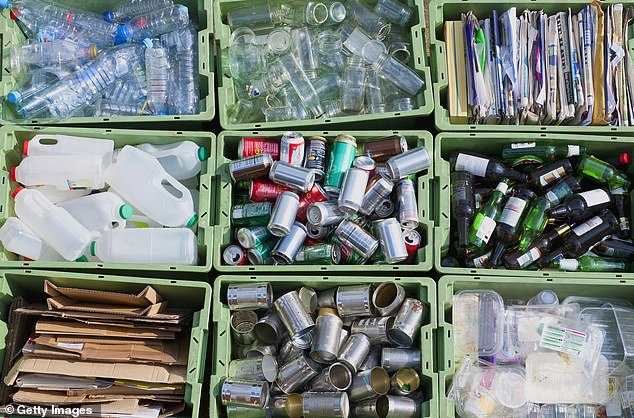Net-zero ‘grocery tax’ on packaging set to push up bills by £1.4bn a year – as retail chiefs warn costs of anti-plastic levy will be passed to shoppers


A new ‘grocery tax’ on packaging materials used by retailers and manufacturers is set to increase bills by £1.4 billion a year.
The legislation has been designed to meet the Government’s net zero targets as it has been claimed it will add up to £56 to household costs annually.
Minister have been accused of passing the green levy ‘quietly’, with retailers and manufacturers to be charged per tonne of packaging materials they use – and charged more for using plastic wrapping than paper or cardboard.
However, concerns have been raised that it will ‘push up food costs for every family’.
The new scheme, called the Extended Producer Responsibility (EPR), will see ‘retail sales increases of around £1.4 billion’ in the first year, according to the impact assessment published by the Department for Environment, Food and Rural Affairs (Defra).
The government forecast say that household bills will increase by £28 a year in the lowest scenarios, £48 in a middle scenario or up to £56 in the highest scenarios.
Lord McKinlay, a Tory peer and chair of the Net Zero Scrutiny Committee, told the Telegraph that the ‘little noticed “grocery tax” legislation’ will add ‘unnecessary costs on consumers’.
The scheme was first put forward by Michael Gove while he was environment secretary but following backlash from Tory MPs and retailers over the costs it was put on hold.

A new ‘grocery tax’ on packaging materials used by retailers and manufacturers is set to increase bills by £1.4 billion a year.

The legislation has been designed to meet the Government’s net zero targets as it has been claimed it will add up to £56 to household costs annually
But earlier this month secondary legislation was passed which will see the levy come into legal force on January 1, 2025.
Lord Frost said that after the plans were originally put together it was ‘rightly realised it was too expensive to introduce’ adding that Keir Starmer’s government ‘doesn’t care about that’.
‘They are obsessed with green politics and are quite happy to impose these new burdens on business which will boost inflation and push up food costs for every family,’ he said.
The cost of collecting and disposing of packaging waste is currently taken on by local authorities and funded by council tax.
However, there has been no suggestion that councils will reduce taxes imposed on households after they begin benefiting from the scheme.
Jim Bligh Director of Corporate Affairs and Packaging, The Food and Drink Federation, said it is ‘crucial that funds are used to improve recycling infrastructure’.
He said: ‘Food and drink manufacturers support the government’s zero waste goal and are committed to a cleaner environment. We welcome the long awaited release of base fees for Extended Producer Responsibility (EPR), which helps manufacturers take more responsibility for packaging and helps them plan for 2025 costs.
‘With EPR expected to cost at least £1.4 billion in 2025, it’s crucial that funds are used to improve recycling infrastructure.

The cost of collecting and disposing of packaging waste is currently taken on by local authorities and funded by council tax

In the first year of the scheme, the cheapest packaging is paper or board packaging, costing £215 per tonne
‘Everyone must work together to ensure EPR drives value, boosts recycling rates, and fosters a circular economy.
‘DEFRA should now empower producers to manage the scheme, encouraging investment, green jobs, and innovation in packaging.’
Yesterday, Defra published a schedule of ‘base fees’ revealing how much retailers will be charged for the collection and disposal per tonne of packaging in 2025/26.
In the first year of the scheme, the cheapest packaging is paper or board packaging, costing £215 per tonne, while materials such as bamboo or hemp costing £280 per tonne.
Plastic is highest-cost material costing £485 per tonne followed by ‘fibre-based composite’ at £455 per tonne.
A Defra spokesman said: ‘This government will end our throwaway society and stop the avalanche of rubbish that is filling up our streets by increasing recycling rates, reducing waste and cracking down on waste crime.
‘Extended producer responsibility for packaging is a vital first step for our packaging reforms which will create 21,000 jobs and stimulate more than £10 billion investment in the recycling sector over the next decade.
‘We continue to work closely with businesses, including the glass industry, on these reforms. We set out illustrative fees which are lower for almost all categories than originally proposed, including for glass.’

